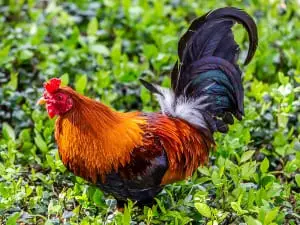
Roosters are known to be the strongest and the proudest birds in your chicken coop, however, these birds are not immune to catching a sickness or suffering from any other condition.
Roosters can get seizures, and knowing how to quickly treat the bird will be of utmost importance.
Table of Contents
Rooster having seizures:
If you’ve noticed bizarre and strange behaviors in your rooster, behaviors that seem as though the bird is having a seizure, then you’d need to quickly tend to the bird.
This is how to tell that the bird is having a seizure and what to do:
Signs that your rooster is having a seizure include:
- Muscle tremors
- Stiffness in the bird’s body
- A thrashing of the legs
- Disorientation
- Random and uncontrolled wing flapping
- A loss of consciousness during the seizure
- Loud vocalizations
The above symptoms will appear during the second stage of a bird having a seizure. Roosters, and other birds, have seizures that happen in three stages, the aural stage, the ictal stage, and finally, the postictal stage.
The first stage, the aural stage starts when your bird starts showing a change in its behavior.
After the aural stage, the bird will enter the second stage, the ictal stage, the loss of muscle coordination kicks in here. This stage can last anywhere from 5 to 25 seconds.
After the ictal stage comes the postictal stage, this is the stage where the rooster becomes agitated, lethargic, exhausted, and confused.
The bird may exhibit some, or all, of the bulleted symptoms at one time. Birds that suffer from seizures need to be treated ASAP.
What to do:
If your rooster is showing signs of having a seizure then the best thing to do for the bird is to immediately take it to the vet. There are no at-home treatment options for bird seizures.
You’d need to isolate the bird and keep it comfortable if you can’t immediately get it to the vet.
Keep your rooster’s stress levels low by isolating the bird in a small cage, a dog kennel, or a cat carrier until you can get the bird to the vet.
Keep the bird comfortable by padding the bottom of your bird’s isolation chamber. Do this to keep the bird from injuring itself if/when it has another seizure and falls.
Keep this enclosure in a warm and dimly lit space until you can get the bird to the vet.
At the vet:
The first thing that the vet may do is give the rooster anticonvulsant medication to quickly, but temporarily stop the bird’s seizures.
The vet will perform a physical exam on the bird as well as do tests, including but not limited to, a radiograph and a blood test on the rooster to figure out what the root cause of the seizures are.
A variety of things can cause seizures in roosters, the treatment that your vet gives your bird will depend on the reason behind the seizures.
The vet may recommend a change in the bird’s diet if the reason behind the seizures is a nutritional deficiency.
If the seizures were caused by an infection then the bird will be given either antibiotic, antiviral, or antiparasitic, medications.
If toxic metal poisoning is the reason behind the seizures then the bird will be given chelating drugs to remove the toxins.
After the vet:
You’d need to give the bird supportive care alongside the treatment that your vet gives your rooster. Keeping your bird in the enclosure after the vet visit may still be necessary, consult with the vet about this.
You’d also need to make sure that you’re giving the bird a nutritionally rich diet as well as enough fluids as it recovers. Do not give the bird water in a deep dish as it recovers, the bird may fall in and drown
If you enjoyed this article then you may also be interested in other chicken related articles. Here are some articles that you may be interested in: Chicken Shaking Head And Stretching Neck, Crowless Rooster, Rooster Stopped Crowing And Mating, Rooster With A Broken Neck, Chicken Seizure

